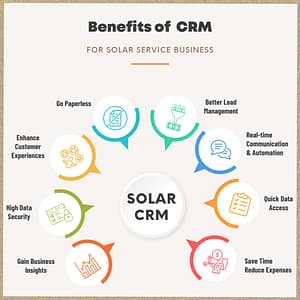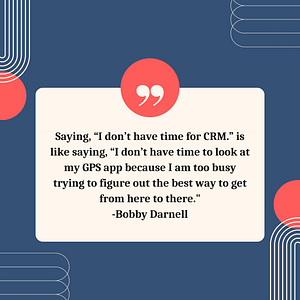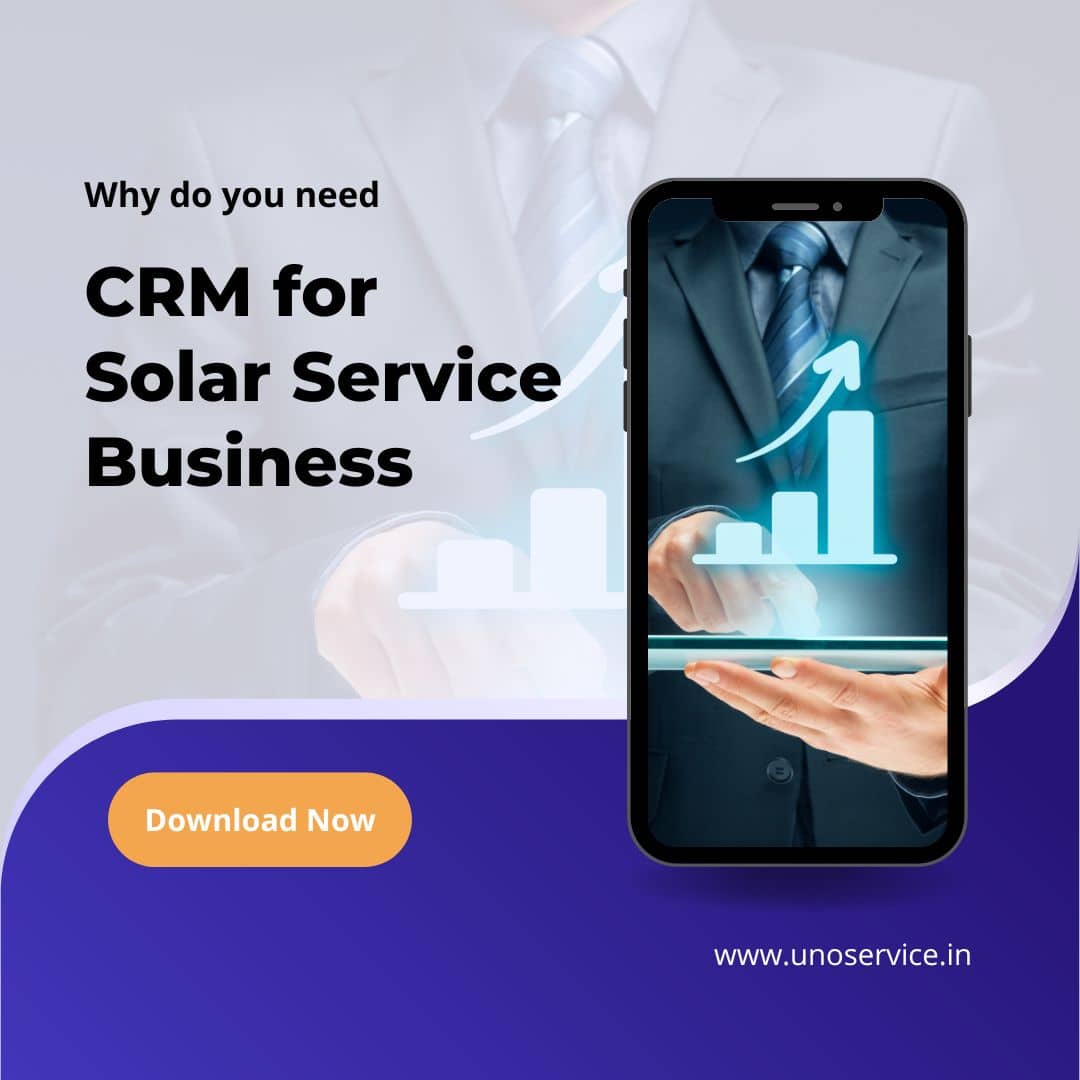With the rise of solar energy and solar technology, there is heavy cutthroat competition in the solar energy business. Customer acquisition costs are rising, and customer expectations are getting more dynamic. To stand out from the competitors, focus on providing unmatched customer experiences with the help of modern technology.
“You’ll never have a product or price advantage again. They can be easily duplicated, but a strong customer service culture can’t be copied”- Jerry Fritz
You can provide good customer experiences only when you know what your customers want and where your business is falling behind. Gaining valuable insights is again only possible with proper data management. Needless to say, a solar energy business has abundant data to record, organize and generate insights from.
“How you gather, manage and use information will determine whether you win or lose.” – Bill Gates
Pen and paper-based systems are time-consuming due to manual data entry and prone to errors, as are Excel spreadsheets. The next most viable solution is using a solar sales CRM. CRM for solar companies is highly beneficial as 72% of businesses say the use of CRM offers them access to better customer data.
The above stats say it is all about the importance of CRM in managing your business data. With solar service CRM, you get access to run a completely paperless service business without a complicated setup. It securely stores data that is accessible via a mobile app.
Unoservice solar field service CRM not only manages your business data but automates repetitive tasks, generates valuable business insights and helps your business progress through every stage.
Let’s dive deeper into what is solar CRM and the benefits of CRM for solar companies.
What is a Solar CRM?
CRM stands for Customer Relationship Management – software that helps your solar energy business to manage relationships with customers is solar CRM software. It fetches data from all customer acquisition channels and records the minutest interactions with your leads and customers in a centralized database.
With all customer data stored in a single place, CRM gives better insight into your customer’s journey and business operations. CRM for solar companies streamlines the workflow of your solar business and keeps it connected end-to-end. It boosts the productivity of your employees, increases business efficiency, enhances customer satisfaction and escalates your solar business growth.
Benefits of using CRM for Solar Companies
Traditionally, solar service businesses have been using pen and paper-based systems to manage customer data. To make a shift to modern technology, you need solid reasons. Here are a few reasons for using CRM for your solar energy business.

To understand why your solar business needs a CRM, let’s walk through the benefits of CRM for solar companies.
1. Go Paperless – Centralized Database for Business Management
Field service businesses like solar energy companies record data in pen and paper-based systems. The office admin or the service manager writes down the lead, customer data and incoming service requests in the books. The field workers report the details of completed field jobs, the service provided, spares installed, etc. to the admin, and he/she again makes a manual record of the service details in the books.
Manual data entry is time-consuming and has higher chances of mistakes and poor handwriting, making it difficult to read. Handwritten data is difficult to track, causing duplicate data entries.
Sometimes, the paperwork gets mislaid, misplaced or even missed. The relevant files and photos for a particular solar installation project get mixed up with another project, causing things to become more complicated.
Witnessing the challenges in paper-dependent systems, solar companies moved to Excel spreadsheets but these were not of much help. The data entry remains manual, leaving room for errors and is time-consuming.
To further simplify data management, switch to solar CRM software solutions. CRM collects customer interactions from various sources – email, phone calls, website visits, online forms, etc. It stores all the data in one place and neatly organizes the data to quickly view the progress of a lead or the business as a whole.
As all consumer interactions and data are available in one place, employee turnovers do not impact the business as the new employees quickly get access to all the data.
2. Better Lead Management
When following up with a lead, you need to be aware of where it stands in the sales funnels and what is stopping it from moving forward. If it’s only one lead, you can still remember it by using notes or even keeping it in mind. Can you imagine having five different prospects at various stages of the sales funnel? Can you still remember them all?
CRM records interactions with every lead such that you get a quick view of where the lead is and how to follow up with a customized offer. CRM helps you get more leads and increase the conversion rate with clear insights into sales lead data.
3. Real-Time Communication & Automation Increase Business Efficiency
Automated Service Follow-ups & Service Reminders
The solar cycles are quite lengthy, requiring frequent follow-ups. Manual follow-ups with every lead and customer several times at different stages of the sales process are quite challenging. CRM for solar companies automate repetitive tasks like collecting customer information, tracking their progress, and following up with them.
Conversion rates may increase up to 300% using a CRM.
Instead of manually entering every detail about each client into the system, use CRM to automate these processes. Once you input a new client’s solar device information, the CRM generates the service dates for preventative maintenance.
With the help of CRM and service reminder software, you can integrate your services into your existing sales funnel by sending text messages and email reminders to customers before their next service appointment.
These reminders keep your business on top of consumers’ minds, and they stay connected to your business. It helps you get ahead of your competition and increase client loyalty and customer retention.
Automated Service Scheduling and Dispatching of Technicians
The in-office service manager can view the schedule of every field worker on the shared calendar across the team. If a new solar project comes up, the CRM finds out which solar field technicians have free slots and schedules them accordingly.
Your back-office service support team and the field workers can view the schedules on the shared calendar and track the progress of work orders on the CRM portal. The automated service scheduling prevents convoluted scheduling that leads to overbooking or double booking of technicians.
With a job assignment, the concerned field technician gets notified on CRM mobile app, and he updates the job status on the same portal. The entire communication happens in real-time with higher accuracy, zero miscommunication and quick data transfer, saving time and increasing efficiency.
4. Quick Data Access from Anywhere
Assume your solar field service agent reaches the client’s location for an assignment and begins inspecting the solar panels and battery packs. To resolve the problem with the solar system, he requires access to solar installation documents; previous job history and a couple more data points. He contacts the in-office support staff to get the information but to no avail. Then he travels to the office to get the paperwork.
With the documents, he returns to the customer’s place, understands the issue with the solar device and begins the servicing. This wastes much time and fuel.
Now assume your solar business uses a CRM to maintain data. When the field engineer reaches the customer’s place, he can access customer data, solar device installation documents, and previous service history from the Unoservice CRM mobile app in a few clicks.
Within a few clicks and fast data access, he quickly grasps the problem and finishes the task faster with a better result. After the task, the solar field service technician uploads the report, and related images or video clips of the work site into the CRM app for later use. The in-office service manager reviews the report and stays informed about task completion.
All the data stored in one place, and properly organized for particular projects help you access any customer’s complete record within a couple of clicks.
Regardless of which person within an organization is taking care of the client, the employee can see everything from previous interactions, dates, reported issues and more. With CRM mobile app, remote data accessibility helps improve workflow and boosts employee efficiency. This enhances the client experience and improves overall business performance.
5. Saves Time & Reduces Expenses
In the above example, we see that the usage of CRM for solar companies reduces the amount of travelling back and forth to the offices. The solar service technicians can quickly create invoices on-site based on the reports submitted through CRM mobile app. Collect instant pay from customers and submit customer signatures through CRM to notify the end of the project. The entire job gets done on-site without any back and forths to the office, thus saving both travel time and fuel costs.

Automated data entry saves time from manually noting down customer data. Eliminating paper usage saves paper costs and the time wasted searching for paper records and relevant documentation.
Automated scheduling saves time in making phone calls to solar service technicians to check their availability and prevents double booking of field workers, saving time otherwise wasted due to miscommunication.
The back office team can use the time saved to focus on business growth strategies and improving customer experiences.
6. Enhances Customer Experience
“Get closer than ever to your customer. So close, that you tell them what they need well before they realize it themselves” -Steve Jobs
CRM tracks every customer interaction like call logs, text messages, emails, video calls, work orders, and solar installation documents. Organized data gives better insights into what the customer wants and how you can improve customer experiences.
47% of CRM users state that CRM technology has an immense impact on their customer satisfaction rate.
First, the CRMs send automatic notifications to clients with the details of the scheduled field engineers along with the map integrations to track their arrival. This ensures that they know who is coming and when he/she will arrive at their location.
On-site instant data access to field engineers help them complete solar service jobs quickly and generate invoices instantly without wasting much of customers’ time. Quick service response is always a top priority for customers.
Customers get highly impressed by your business when you send timely service reminders showing how you value your customers. Customizing the reminders with personalized discounts makes them feel appreciated and increases your conversion rates.
7. Higher Data Security
Unoservice CRM puts an end to the difficult-to-organize paper files, incomplete records and missing documentation. Your data stored in a cloud-based database is highly secure and easy to use. Cloud servers have very high processing power resulting in quick data retrieval. The data gets stored in a cluster of multiple servers, hence even if one server is down, your data remains intact.
Cloud storage lets you store enormous data without bothering about storage space or higher storage costs. There is regular data backup and high-level encryption allows only authorized users to access the data limited and customized to the role they serve.
For example, the stakeholder of your solar business has full control over all business operations, whereas the field worker only gets limited information from certain customers.
8. Gain Business Insights
CRM not only provides one-stop customer data management but also provides insights into key performance indicators (KPIs) for tracking the progress of your business. You can easily monitor the progress of your business through these KPIs.
Quickly have a view of your most important business KPIs like the number of jobs completed per day, customer acquisition cost CAC, customer retention rate, revenue generated, etc. These insights help you make better data-driven decisions that grow your business.
You can also track individual employee performance to incentivize the ones with good results and motivate the employees to perform better.
How to Choose the Best CRM for Solar Business?
A recent 1E report demonstrates that $30 Billion are wasted on unused software.
There are many CRM software solutions available in the market but choose the best CRM for solar companies. CRM is not for one-time usage; prolonged use of field service CRM for an entire business lifetime yields better results for your solar business.
Consider the following points while choosing a solar field service CRM:
- Make a note of the CRM features that your solar business needs.
- Look for the CRM options in the market that match your requirements.
- Look for CRM that is easy to use by all employees without much training.
- Check whether it is simple enough and not highly complicated taking more than 10 clicks to complete a particular task.
- Does the CRM provide app integration so that you don’t need to switch between different apps?
- Is the CRM affordable and does not add up to higher soft costs for your solar business?
- Is the CRM scalable with a growing business model so that you do not have to switch to other solutions in future?
Conclusion
CRM removes the ambiguity from business, helps to make better data-driven decisions and automates the time-consuming tasks in your solar company to improve customer experience. CRM forms the core of a solar service software stack or field service management software for the solar industry.
Unoservice is one of the best solar field service CRM for solar companies available in the market that can be highly customized to match your business requirements. CRM integrated with field service management software greatly simplifies and automates your field service business operations. Book a free demo to view the potential of the Unoservice FSM application to grow your business.
Frequently Asked Questions about CRM for Solar Companies
Why does a solar service business need a CRM?
These are the signs that your solar business needs a CRM:
You find it difficult to follow up with your leads and miss out on converting them.
Hard to locate or access customer data in large paper records.
Miscommunication between departments causes service delays and scheduling conflicts.
You cannot track the real-time status of service jobs.
Your solar field service technicians cannot access customer data and history remotely.
Finding it tough to scale your business without proper data management.
Why is field service CRM better than Excel spreadsheets?
Data entry is manual in Excel whereas CRM automatically fetches data from all customer touchpoints like online forms, social media, newsletters, etc. Excel stores data while CRM automates business processes like sales and marketing tasks. CRM lets your team collaborate and view real-time updates.
Why does your solar energy company need CRM for managing leads?
CRM keeps track of every lead and where the lead stands in the sales funnel. It records business interactions with the leads and gives better insights into how to convert those leads into sales. With automated follow-ups by CRM, you do not miss out on any leads.
Do you need a CRM for a small solar service business?
CRM is a basic requirement for businesses of all sizes to maintain better customer relationships. When your business receives a couple of clients, invest in a solar CRM to streamline the workflow of your business and provide better service to every customer.
What happens if the business does not use CRM software?
Without CRM software, the customer data is not properly organized for quick one-click retrieval. Without CRM, you waste time on redundant and mundane tasks lowering the business efficiency. You can miss out on leads and customer retention. You do not get a clear picture of how your business is performing, what needs improvement and how far have you achieved your business KPIs.
